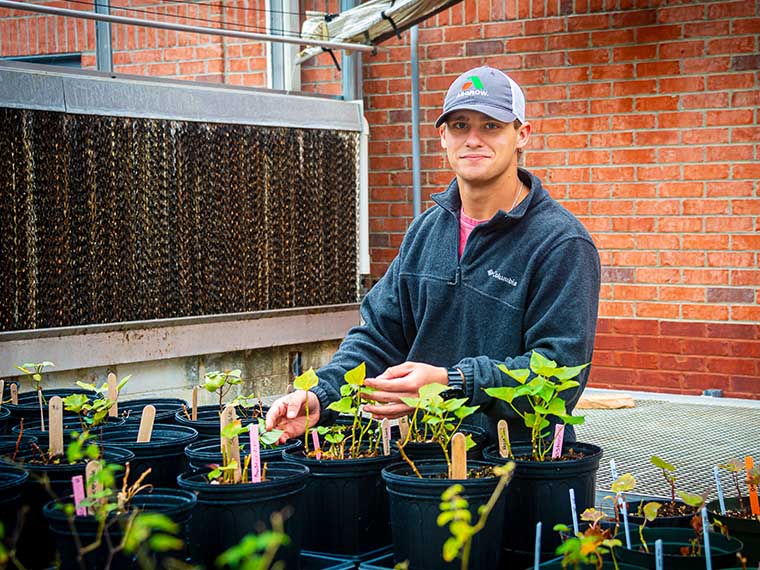The information presented on this page may be dated. It may refer to situations which have changed or people who are no longer affiliated with the university. It is archived as part of Mississippi State University's history.
Sweet potatoes are a holiday favorite, often covered in butter, cinnamon, or marshmallows, and baked to perfection. Mississippi ranks third in the nation in sweet potato production with Vardaman, Mississippi being known as the Sweet Potato Capital of the World.
With some 29,000 acres of sweet potatoes covering Mississippi farms, weed control is paramount for optimal crop yields. Fortunately, sweet potatoes have a built-in ally to help suppress problematic weeds. Some varieties produce biochemicals that naturally control weeds, a process known as allelopathy.
Andrew Nuss, a junior agronomy major with a concentration in integrated crop management, is studying the impact sweet potatoes have on Palmer amaranth, a particularly troublesome weed throughout the state.
Nuss is conducting research under Dr. Te-Ming Paul Tseng, MAFES weed scientist and assistant professor in the Department of Plant and Soil Sciences. They are investigating which sweet potato varieties are allelopathic to Palmer amaranth.
The project is in its early stages and will continue into next year, starting with the planting of the sweet potato varieties. The sweet potatoes will be exposed to Palmer amaranth, a weed known to decrease sweet potato yield. Nuss will then evaluate which variety is the best at suppressing Palmer amaranth.
"We want to know which varieties suppress Palmer amaranth, while also evaluating the crop's growth and yield," Nuss states. "The overall goal is to identify a variety that will produce relatively high yields, all while suppressing the weeds to which it is exposed."
A native of Hartsell, Alabama, Nuss grew up in a family that raised cattle and grew hay. He always knew he would pursue a career in agriculture. Though he was fan of Auburn University, a single campus tour turned him true maroon.
As an MSU student, Nuss has garnered field experience in row crops and entomology. Studying corn, cotton, and soybeans opened the door for Nuss to move into weed science as an Undergraduate Research Scholar, something he knows will broaden his horizons.
"This research and work has diversified my knowledge and helped me understand agriculture on a much larger scale, which I know will help me as I pursue a career," Nuss explained.
Most importantly, the work I am doing will help farmers, which is a pretty remarkable accomplishment as an undergraduate student, he added.

